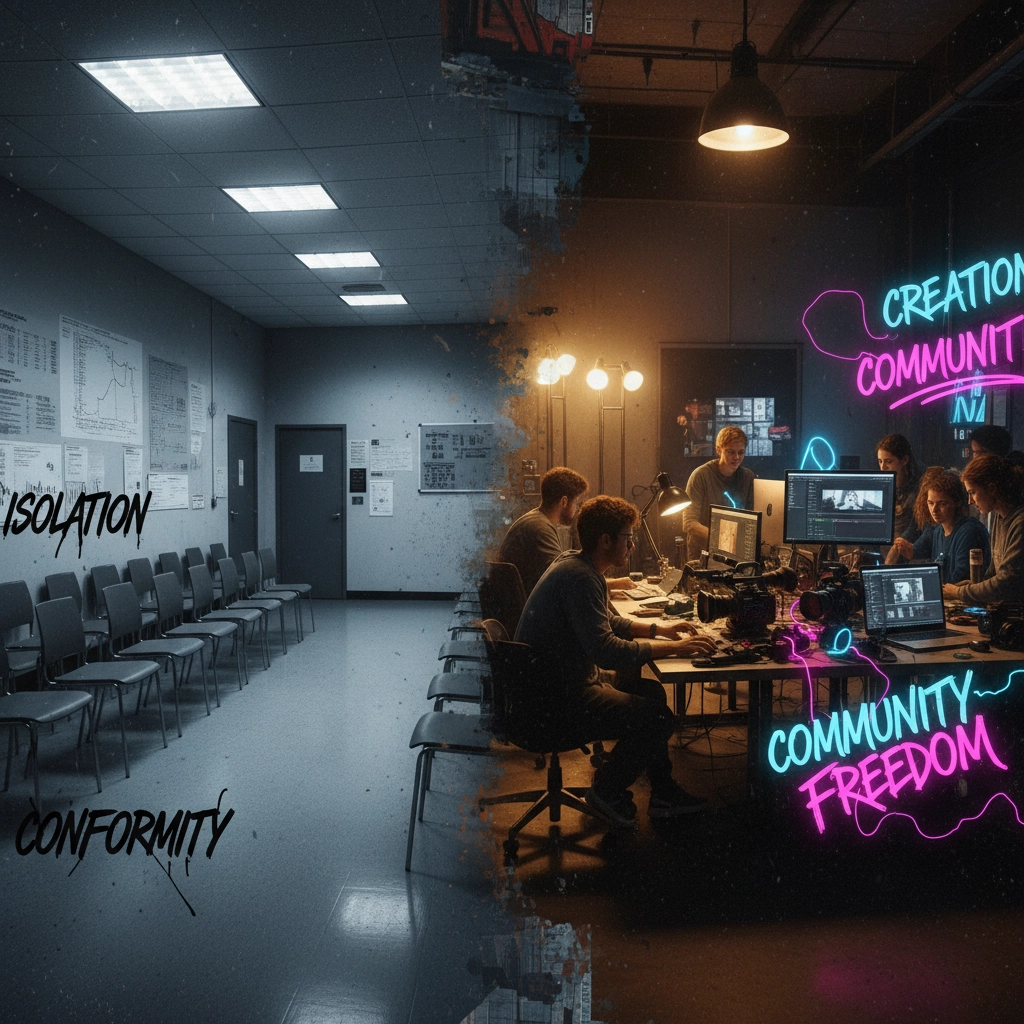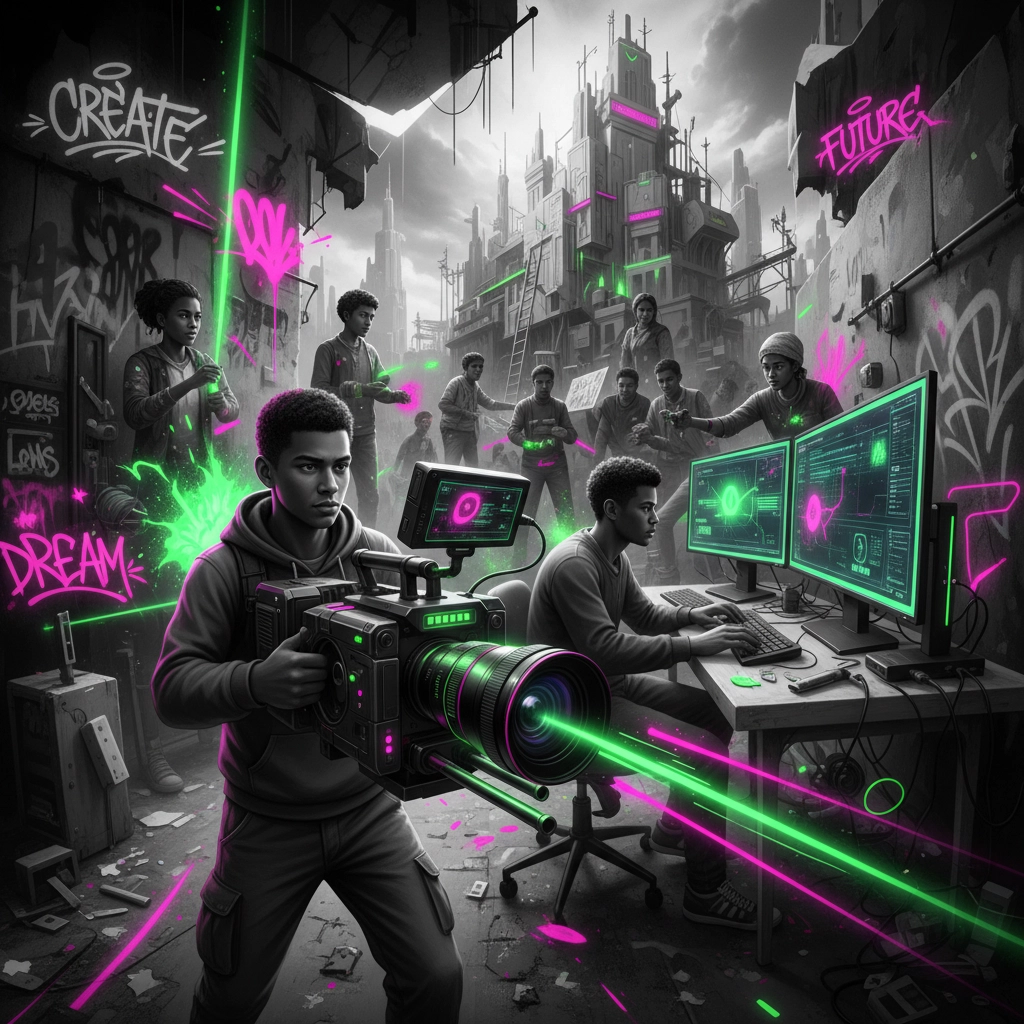SEND Filmmaking Projects vs Traditional Therapy: Which Better Empowers Young People in Colchester?
- dbmorgan
- Nov 17, 2025
- 5 min read
Hey there! Let's have an honest conversation about something that's been weighing on my mind lately.
Last week, I watched Ryan – a young person who eighteen months ago was near-non-verbal and struggling to connect with the world – confidently present his latest film project to a room full of adults. His mum, Lisa, sat in the back with tears in her eyes, not of sadness, but of pure pride. This transformation didn't happen in a clinical setting or through traditional therapeutic interventions. It happened in our studio, with a camera in his hands and a story to tell.
This moment crystallised something I've been thinking about for ages: Are we approaching SEND support in the right way?
The Traditional Therapy Landscape: Well-Intentioned but Limited
Don't get me wrong – traditional therapy has its place. Cognitive behavioural therapy, occupational therapy, speech and language support – these interventions have helped countless young people. But here's what I've observed after years of working with neurodiverse young adults: traditional approaches often focus on fixing what's 'wrong' rather than amplifying what's extraordinary.
The typical pathway looks something like this: assessment, diagnosis, intervention plan, weekly sessions, progress reviews. It's clinical, it's structured, and for many young people, it feels like being dissected under a microscope. The power dynamic is clear – professional as expert, young person as patient. The environment is sterile. The approach is deficit-focused.
And the outcomes? Mixed, at best. Too many young people leave traditional therapy feeling like they're broken parts that need constant maintenance rather than creative humans with stories worth telling.

Why Community Filmmaking Changes Everything
Here at Underdog Crew Studios, we've stumbled onto something profound. Not through academic research or clinical trials, but through lived experience and genuine human connection. We've discovered that when you put a camera in the hands of a neurodiverse young person and say "tell your story," magic happens.
Creative empowerment isn't just therapy – it's transformation.
Let me break down what makes our approach fundamentally different:
1. Asset-Based, Not Deficit-Focused
Traditional therapy often starts with what's 'wrong': "This young person struggles with social communication." Our approach starts with what's brilliant: "This young person has a unique perspective that deserves to be heard."
Ryan's mum, Lisa, put it perfectly: "For the first time, Ryan was seen, understood, and encouraged to grow rather than to 'cope'."
2. Peer Community, Not Isolated Sessions
While traditional therapy typically happens in one-on-one sessions, our filmmaking projects create natural peer communities. Young people collaborate, support each other, and learn that they're not alone in their experiences. There's no stigma because everyone's here to create, not to be 'fixed'.
3. Real-World Skills, Not Just Coping Mechanisms
Traditional therapy teaches coping strategies. We teach camera operation, editing software, storytelling techniques, public speaking, and project management. These aren't just therapeutic tools – they're employability skills that open doors to creative industries.
Antony Ketley-O'Donel from Doucecroft School tells us: "Our students look forward to every session and remain fully immersed throughout, exploring a diverse menu of over 30 creative, enterprise-based activities. Underdog Crew Studios doesn't just educate – they ignite potential."
4. Lived-Experience Leadership
This might be the biggest game-changer. As an autistic leader, I understand the neurodiverse mind from the inside out. I'm not observing difference – I'm celebrating it. Our entire team consists of lived-experience educators who don't just teach about neurodiversity, we embody it.
The Evidence: What We're Seeing in Colchester
Let me share some concrete outcomes that speak louder than any clinical assessment:
Community Impact:
Over 30 young adults supported through filmmaking projects in just one year
Named Colchester City Mayor's Charity of the Year 2025/26
Partnerships established with Doucecroft School and Chelmsford CCI College
National press coverage for our innovative approaches
Individual Transformation: Our recent projects tell the real story. 'Teen Voices' – our National Lottery funded multimedia anthology – has given Essex youth a platform to share autism and mental health stories through film, rap, poetry, and spoken word. 'The Slip', our teen drama series funded by Anglian Community Trust, provides national platform for lived experience storytelling.
But the numbers only tell part of the story. The real evidence is in moments like watching a young person who was previously school-phobic eagerly arrive at our studio every week. It's hearing parents say their home life has transformed because their child finally has hope and purpose.

Why This Approach Works: The Science Behind the Magic
There's solid reasoning behind why community filmmaking succeeds where traditional approaches sometimes fall short:
Executive Function Development: Filmmaking requires planning, sequencing, problem-solving, and project management – naturally developing executive function skills through meaningful activity rather than abstract exercises.
Social Skills in Context: Instead of practising conversation skills in artificial scenarios, young people collaborate on real projects with shared goals and genuine investment in outcomes.
Emotional Regulation Through Expression: Rather than talking about feelings in therapy rooms, young people process emotions through creative storytelling, developing natural emotional vocabulary and regulation strategies.
Confidence Through Competence: Nothing builds self-esteem like mastering real skills and creating something meaningful that others value and celebrate.
The Partnership Model: Schools, Studios, and Success
Our partnerships with local educational providers like Doucecroft School demonstrate how filmmaking projects can complement and enhance traditional support systems rather than replacing them entirely. We're not anti-therapy – we're pro-empowerment.
Weekly sessions blend life skills with creative challenges, giving Pathway Students practical experience in:
Professional filmmaking techniques
Set design and sound recording
Public speaking and presentation skills
AI-assisted productivity tools
Graphic design for employment
Collaborative project management
These aren't just activities – they're pathways to self-sustaining careers and meaningful community contribution.
Addressing the Sceptics: "But What About Clinical Outcomes?"
I know some professionals reading this are thinking: "This sounds lovely, but where's the clinical evidence?"
Here's my response: Look at the young people.
Ryan now attends college and performs with confidence. Lisa says their family life has changed beyond words – laughter has returned, hope has returned, and their son finally has a future that feels possible.
That's not just a nice story. That's measurable life change.
Our young people aren't just coping better – they're thriving. They're not just managing symptoms – they're discovering strengths. They're not just surviving the education system – they're preparing for meaningful careers in creative industries.
The Future of SEND Support: Creative, Community-Centred, Empowering
The future of SEND support isn't about choosing between traditional therapy and creative approaches. It's about recognising that different minds need different pathways to empowerment.
For too long, we've asked neurodiverse young people to fit into systems designed for neurotypical minds. What if instead, we created systems that celebrate cognitive diversity and harness the unique strengths that neurodivergent individuals bring?
What if the question isn't "How do we fix these young people?" but "How do we unlock their potential?"
Your Next Step: Join the Movement
Whether you're a parent watching your child struggle in traditional systems, an educator looking for innovative approaches, or a local authority professional seeking evidence-based alternatives, I invite you to visit our studio and see this transformation in action.
Our SENergise programme isn't just changing individual lives – it's reshaping how we think about SEND support entirely. From confidence-building workshops to professional skills training, from peer mentorship to industry partnerships, we're proving that empowerment happens when young people are seen as creators, not cases.
The young people of Colchester deserve more than coping strategies. They deserve opportunities to shine.
Ready to see the difference for yourself? Contact us to arrange a studio visit, discuss partnership opportunities, or learn how your young person can join our creative community.
Because here's what I know for certain: when we stop trying to fix people and start celebrating their brilliance, extraordinary things happen.
And that's not therapy – that's transformation.











Comments